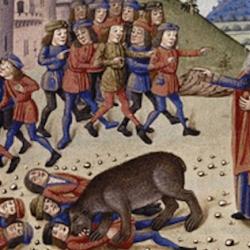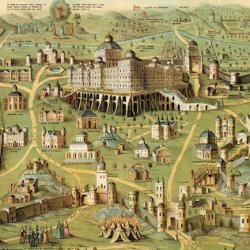During the reign of Jehoahaz of Israel, the northern kingdom experienced an exodus (2 Kings 13:1-6):
1) Israel had sinned and therefore the Lord became angry and gave them into the hand of Aram, as often happened during the times of the Judges.
2) Jehoahaz “became ill.” The word is translated in the NASB as “entreated the favor” but it is the normal word in Kings for illness (cf. 2 Kings 1:2; 13:14). The text says that Yahweh “heard” Jehoahaz, even though the text never says that Jehoahaz said anything. Apparently, Yahweh is responding to Jehoahaz’s illness itself, and perhaps to the pain caused by it.
3) Yahweh not only “heard” the sickness of the king, but “saw” the oppression of the nation (v. 4b). So also, the Lord saw that Egypt was oppressing Israel (Exodus 3:9). The combination of “hearing” and “seeing” also connects with the temple dedication passage in 1 Kings 8.
4) Yahweh sent Israel a “savior,” as he had sent the judges (v. 5). The word for “savior” is a substantive participle of YSHA, and this form puns with the name “Moses” (Heb. “savior” is MOSHIA).
5) The savior delivers Israel from the hand of her enemies, and Israel returns to dwell in “tents” (v. 5) as they had in the wilderness following the exodus. (The word translated as “formerly” in the NASB is connected with the root for “three” and means “three days ago” – thus introducing the third-day resurrection idea.)
6) Yet, in spite of this great Exodus, Israel continued in idolatry.
These few verses are the history of Israel in a nutshell, not only of the northern kingdom but of Israel as a whole. The shocking thing about this is that Yahweh intervenes to save Israel without any show of repentance from the king or the people. Jehoahaz is an evil king (v. 2), and the people continue to worship golden calves.















